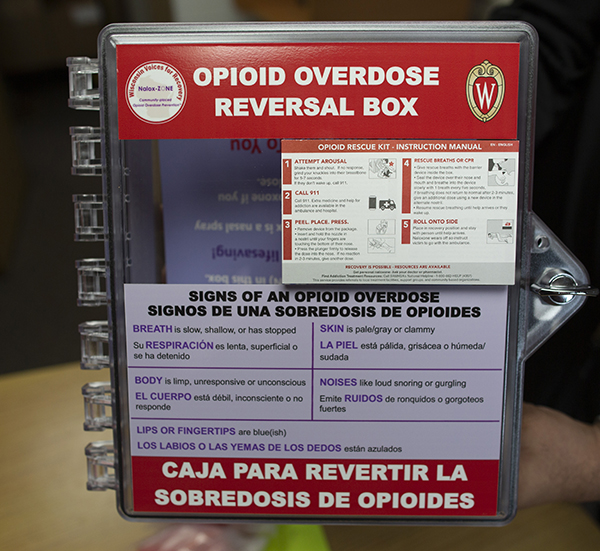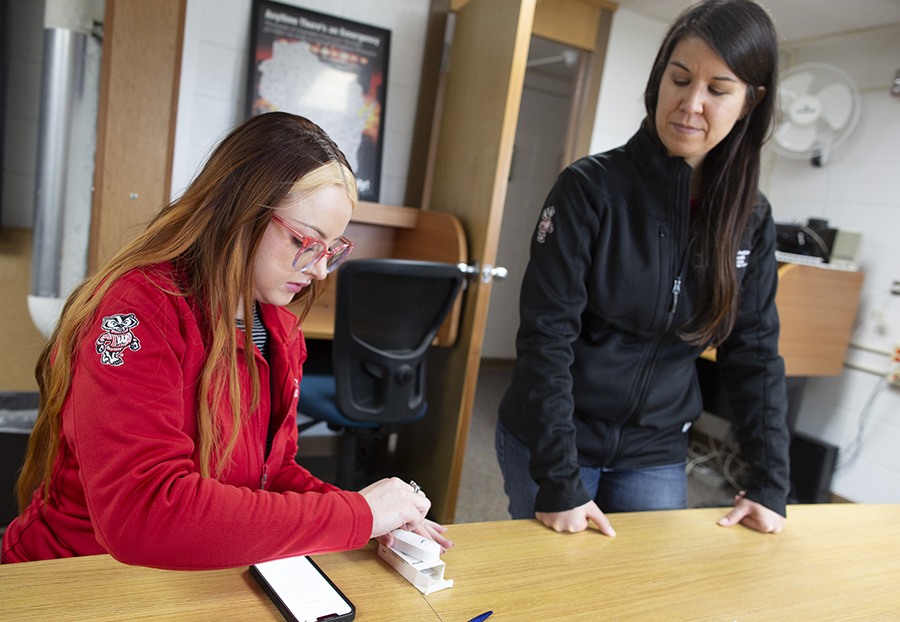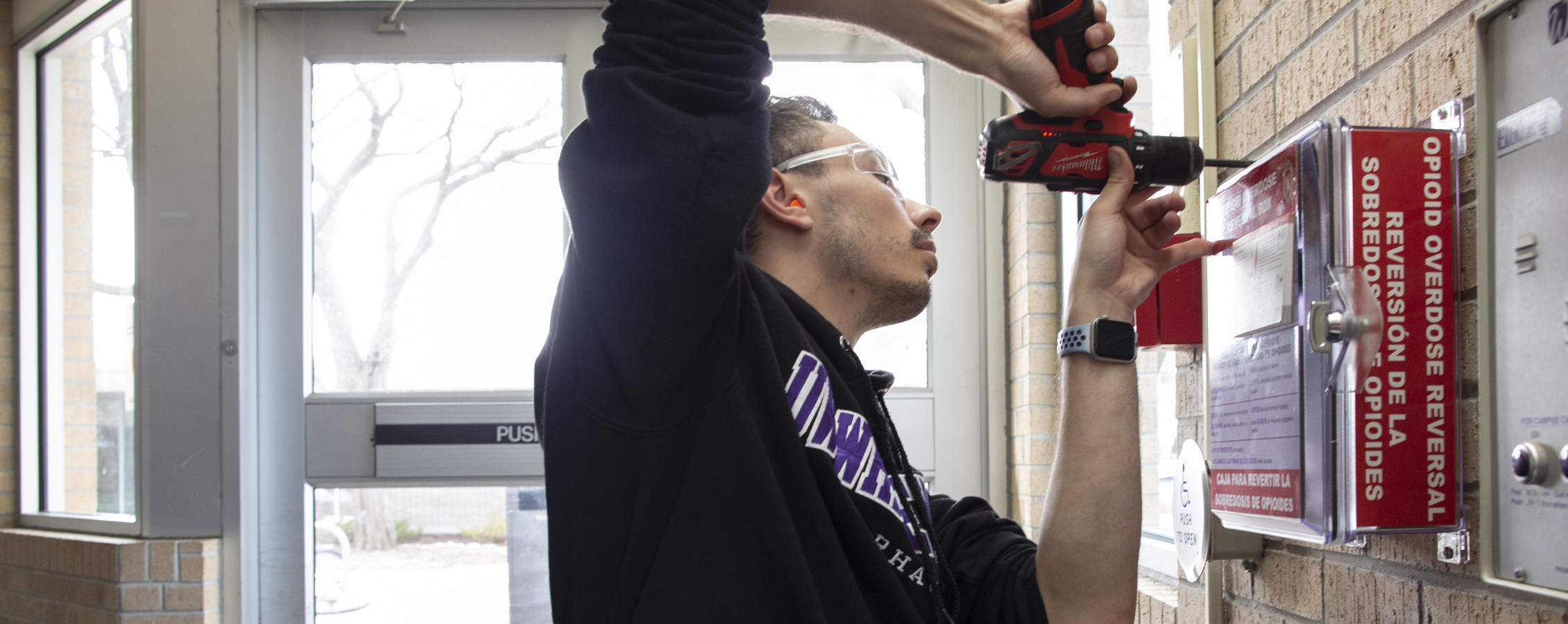UW-Whitewater partners with Wisconsin Voices for Recovery to install overdose kits
March 29, 2023
Photos by Craig Schreiner
Buildings across the University of Wisconsin-Whitewater are now being equipped with naloxone, a medication that helps reverse the effects of an opioid overdose.
This university-wide effort — a partnership with Wisconsin Voices for Recovery that includes both the Whitewater and Rock County campuses — involves installing naloxone rescue boxes in 22 strategic locations in residence halls and academic buildings, as well as visitor-centered areas like the James R. Connor University Center and the Williams Center. A complete list of locations where the boxes will be installed can be found on Police Emergency Information.
The university is taking this step as a proactive, life-saving measure, said Matthew Kiederlen, UW-Whitewater police chief.
“While the number of incidents of opioid overdose in the university community is extremely low and our police officers have had naloxone/Narcan available for several years, providing the general public and community the ability to assist before we can arrive on scene can save a life,” Kiederlen said.
UW-Whitewater police officers and student CSOs (community service officers) have been trained to administer naloxone. Voluntary training will be made available to other university employees.

Placed near AEDs (automated external defibrillators), the boxes at UW-Whitewater will be stocked with naloxone in nasal spray form courtesy of Wisconsin Voices for Recovery.
Naloxone — known widely by the brand name Narcan — is an FDA-approved medication that can rapidly and temporarily reverse an opioid overdose from heroin, synthetic opioids like fentanyl, and prescription pain relievers like oxycodone and morphine.
“Other drugs have been found increasingly laced with fentanyl and users are therefore inadvertently consuming and accidentally overdosing,” said Jenny Kwapil, who serves as a counselor and alcohol and other drug abuse (AODA) coordinator. “Having readily available access to naloxone can save lives if it is administered immediately after an overdose. This program aligns with our duty and commitment to student care and wellbeing, as well as community safety.”
The Wisconsin Department of Health Services reports the state had 1,427 opioid overdose deaths in 2021, up about 16% from 2020. The region (Walworth, Rock, Jefferson counties) had 97 confirmed overdose deaths in 2021, an increase of 28% from 2020.
Cindy Burzinski, Wisconsin Voices for Recovery director, said her team is pleased to facilitate access to naloxone at UW-Whitewater.
“The mission of our Nalox-ZONE program is to increase access to naloxone by installing as many boxes as possible across Wisconsin, supporting harm reduction efforts to save lives and prevent fatalities as a result of opioid overdoses,” Burzinski said.

From left, Meghan Vieth, Nalox-ZONE program coordinator, and Cindy Burzinski, director of Wisconsin Voices for Recovery, both based in the Department of Family Medicine and Community Health at UW-Madison, prepare for the installation of more than 20 opioid overdose reversal boxes on the UW-Whitewater campus on March 29, 2023.
Included in the Nalox-ZONE boxes are “211” cards, which is the number to call to inquire about treatment and recovery resources. They also contain CPR masks, and Narcan administration instruction tear-off sheets for easy access in emergencies (and to take to just have). The boxes are monitored wirelessly by sensors that detect when they have been opened, so they can be restocked if necessary.
Naloxone is available at pharmacies, but many people are reluctant to purchase the product in those locations because there is a record of who bought it and when, said Julie Martindale, health director at UW-Whitewater. Retrieving the medication on campus provides anonymity.
Calling 911 so that emergency medical services staff can help the person in need is a critical first step in overdose response. Naloxone can help keep the person breathing until additional medical help arrives.
“While naloxone should only be used when there is a high suspicion of overdose, it’s also important to understand that you can’t hurt anyone by administering naloxone as a precaution to someone who turns out to not be overdosing. You can only save a life,” said Martindale.
In addition to the AEDs, life safety kits accompany each naloxone rescue box, containing tourniquets, pressure bandages and medical gloves, designed to allow folks to assist those injured in a traumatic event.
Wisconsin Voices for Recovery’s Nalox-ZONE Box Program began in 2020 and continues to expand. For more information about the program or to make a donation, contact NaloxZone@fammed.wisc.edu. The program acknowledges the Wisconsin Department of Health Services, Narcan Direct Program for providing naloxone that helps make the program a success.

